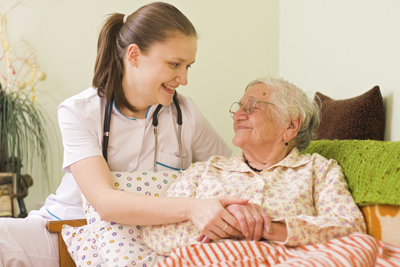How to Know You’re Getting the Best Caregiver

Having someone come into your home and assist with personal care is a very intimate arrangement. Relying on someone else to prepare meals, run errands, or do anything you have always done for yourself sets up an unusual household dynamic that requires cooperation and understanding from both parties. It’s most basic requirement for success is trust, but it can be hard to know how to know you’re getting the best caregiver.
As a care recipient, you must come to trust the individual who is serving as your caregiver, whether it be a family member or a paid professional. This cannot and does not happen instantly, for trust must always be earned, and earning and establishing trust takes time.
How to Know You’re Getting the Best Caregiver
First of all, “best” can only be described in terms of what is best for a specific individual. The “best” caregiver is one whose skills, experience level, and cultural awareness match what you, the care recipient, needs to feel comfortable fairly quickly in the presence of this individual.
If, within a few days after the caregiver/care recipient relationship is initiated, you find yourself not dreading the days the caregiver will be in your home, you’re off to a good start. More than likely, if you don’t dread the caregiver’s presence, it’s because a couple of very basic things are going well:
- The caregiver has demonstrated the proper skills to attend to your physical needs. If your caregiver is a professional, a personalized plan of care is being implemented in a satisfactory manner.
- The caregiver’s personality and demeanor make you feel comfortable. You find it easy to understand her promptings and feel no resentment or emotional strain in her company.
If, within a few days, neither the work habits nor the personality of the caregiver feel right, you should, if possible, find another caregiver. Over a period of time you will be able to recognize other basic, necessary traits for the relationship to be successful…regular attendance, punctuality, and an upbeat attitude that requires the caregiver to leave her personal problems at home. The most fortunate care recipients also find in their caregivers certain qualities that make them “superior” in their performance, all of which are mental and emotional qualities that go beyond their technique in assisting with activities of daily living:
- You can tell from her patience in dealing with your physical limitations, your moods, and even your impatience with your own limitations that your caregiver is naturally empathetic and compassionate. You’re in good hands even during your worst days.
- Your caregiver has demonstrated good judgment time and again as she shuffles the care plan to completion while considering the aches and pains that sometimes prevent you’re being less than cooperative.
- She knows how to inspire your cooperation without being even slightly intimidating or threatening.
- Most of all, her attitude, mood, and actions clearly say, “for the time I am here, caring for you is the most important thing in my life.”
If, within a few months, you find yourself wondering how you ever got along without your caregiver, you will know you have gotten the best one…the best for you, even if she wouldn’t have necessarily been the best for someone else.


